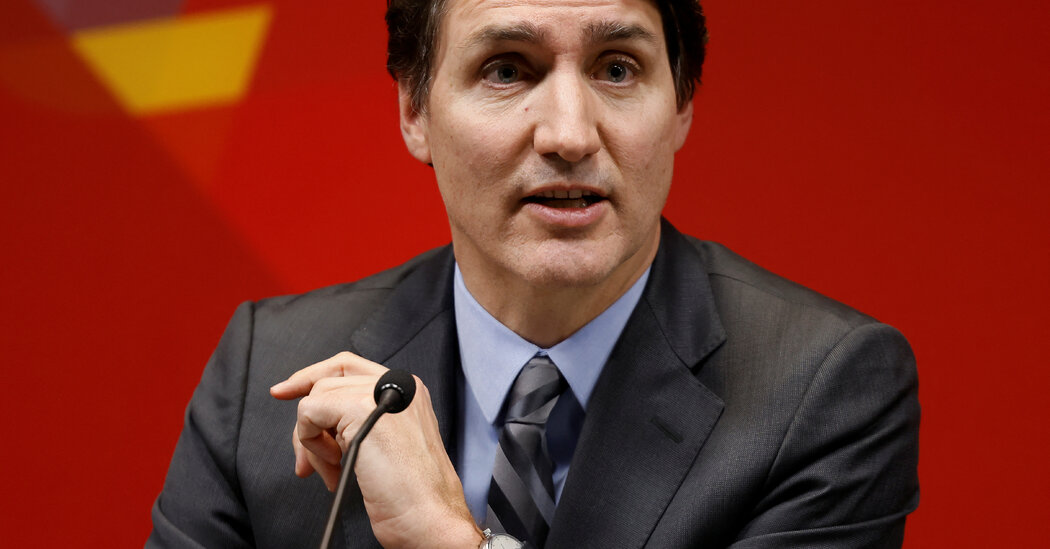
The Canadian government is preparing billions of dollars in retaliatory measures against US exports to Canada if President-elect Donald J. Trump follows through on his threat to impose tariffs on Canadian goods, setting up a potential showdown between the two countries that are each other’s biggest trading partners.
Canada is drawing up a list of measures, including tariffs on US exports to Canada and levies or other restrictions on key Canadian exports to the United States, if Mr. Trump imposes a comprehensive 25 percent tariff on Canadian goods.
But the government has made clear it will wait to see what Mr Trump might do before responding.
“Everything is on the table,” Prime Minister Justin Trudeau said during a news conference in Ottawa, accompanied by senior members of his government and the leaders of most countries. Canadian provinces and territories. Mr. Trudeau spent much of Wednesday discussing with provincial leaders how best to prepare for potential U.S. tariffs.
For now, the Canadian government is working under the assumption that Mr. Trump is serious about the tariffs, which he has linked to the flow of undocumented migrants and drugs across the US-Canada border.
Canada has already announced a series of steps intended to strengthen the border, including more personnel and technology. The government said Wednesday it is also deploying Blackhawk helicopters and more drones to step up surveillance of the shared border.
But in recent weeks, Mr. Trump has made statements suggesting that his motivation for possible tariffs on Canadian goods may not be alone border security. The newly elected president has repeatedly talked about Canada becoming another US state, even threatening the economic powerhouse to annex the country.
Mr. Trump argued that Canada runs a trade surplus with the United States, while the United States makes important defense guarantees to Canada, to make the case that the relationship is in Canada’s favor and that the imbalance needs to be addressed.
Mr. Trump’s comments were met with disbelief and anger among Canada’s political leaders.
Any tariffs would violate the trade agreement between the United States, Mexico and Canada, originally known as NAFTA (North American Free Trade Agreement), which was renegotiated during Mr Trump’s first term as president. It is scheduled to be renewed next year, but the imposition of tariffs by any country would violate the agreement, potentially rendering it moot.
Mr. Trudeau said Wednesday that Canada is ready to meet any aggressive economic moves by the incoming Trump administration with equal aggression.
“I support the principle of a dollar-for-dollar response,” said Mr. Trudeau. Officials said that could prompt Canada to impose tariffs on hundreds of billions of dollars worth of goods exported to the United States.
Canada could impose tariffs on key US imports such as orange juice, officials said, although Mr. Trudeau acknowledged Wednesday that tariffs imposed by either government would ultimately hurt both countries and their consumers.
The debate over how to deal with the potentially crippling tariffs has strained relations between Canada’s federal government in the capital, Ottawa, and its powerful provincial leaders.
While the majority of prime ministers united behind Mr. Trudeau and tried to project a “Team Canada” approach, some took the opposite tack.
Danielle Smith, the leader of Alberta, a key source of oil for the United States, has repeatedly said she would not allow her province’s key resources to be disrupted, even if targeting oil exports to the United States strengthens Canada’s negotiating hand.
Ms. Smith, who went to Mar-a-Lago this week to meet alone with Mr. Trump, attended Wednesday’s meeting remotely and did not sign the joint statement issued by provincial leaders and Mr. Trudeau. Instead, she issued her own statement.
“Federal government officials continue to publicly and privately float the idea of cutting off U.S. energy supplies and imposing export tariffs on energy and other products from Alberta to the United States,” Ms. Smith said in post on X. “Until these threats end, Alberta will not be able to fully support the federal government’s plan to address the tariff threat.”
Mr. Trudeau, members of his government and premiers from other provinces they made it clear that tariffs on oil exports must remain on the negotiating table as a possible lever to pressure the Trump administration.
About 80 percent of Canadian oil is exported to the United States, which relies on Canada for more than half of its oil.
If Canada retaliates with its own tariffs, “it has to be fair across the country,” Mr. Trudeau.
Mr. Trudeau announced this month that he plans to resign by early Marchwhen his party, the Liberals, elects a new leader who will also become prime minister. The country is expected to go to federal elections soon, sometime in the spring, putting a virtually incompetent leader at the helm of the first phase of the new Trump administration.






